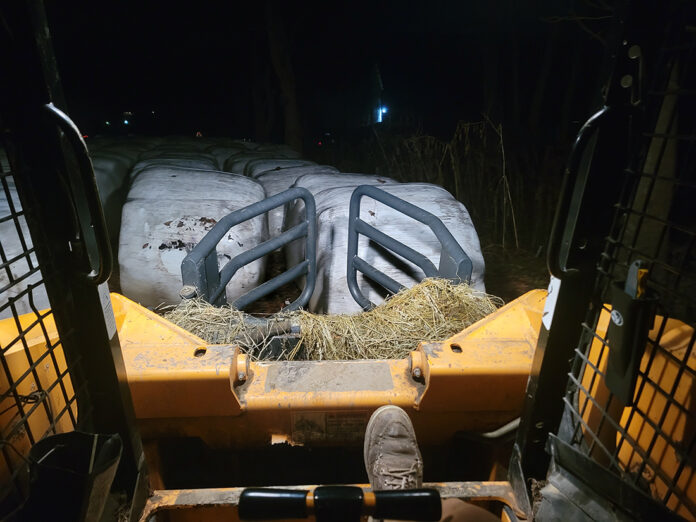Updated Dec. 14 at 1:20 p.m.
It was spitting rain and about 36 degrees last Tuesday. My favorite kind of December weather.
I’d been stomping around in the mud in the dark for the last hour or so, feeding and watering the animals, cleaning the barn and putting down fresh bedding for the pregnant ewes.
I thought I was home free, but realized I hadn’t checked the sheep outside. Their bale ring was empty, and I already sent my teenage helper home. I guess this was my job to do alone.
“Someone should thank me,” I thought to myself, darkly, sarcastically, as I steered the skid loader down the greasy path back to the sheep pen. I pulled my sweatshirt sleeves over my bare hands as I squinted into the cold mist.
That’s what all those memes and social media posts say, right? If you ate today, thank a farmer.
I see them shared particularly when the weather is bad, but they pop up at all times of the year. Thank a farmer because they have to take care of livestock no matter the conditions outside. Thank a farmer because they have to spend time away from their families during harvest.

If I had a dollar for every time I saw the phrase online or heard it at a workshop or field day, I might be able to buy a new(er) skid steer with an enclosed cab and a heater.
Please, do not thank me for being a farmer.
Although it may feel like it at times, being a farmer is not an obligation. It is not a divine right (although I love that Paul Harvey speech, too).
It’s a choice. Just like being an educator, a healthcare worker or a first responder is a choice. And those are all jobs that, in my mind, are also essential for modern life.
Heck, I might even go as far as to say it’s a privilege to be a farmer. I like to complain as much as the next guy about the weather or markets or regulations, but let’s get real here. It is an absolute privilege to do the things we get to do. To work so closely with the land and the environment, to witness life and death, to produce something that can nourish one’s family and other people’s as well.
If it feels like a burden, then perhaps it’s time for you to reassess.
Shop small
I have some practical suggestions for how to show your support for farmers. I’m a fan of putting your money where your mouth is.
You can do that literally by finding a local or small farmer or producer from which to buy food, goods or even services. I bet if you tried, you could find a local producer to buy not only meat, milk and eggs… but also vegetables, flour, honey, maple syrup, cheese and more. Yes, even in western Pennsylvania or eastern Ohio.
People did this during the first several months of the COVID-19 pandemic. When conventional supply chains broke down, people went back to smaller, local sources and it was a boon for the little guys.
The thing is, these farmers had been there all along, and we’re still here, even if some of those new customers are not. The buy-local boom didn’t last, because we’re creatures of habit. Buying locally is harder than getting everything you need all at once from Walmart or Costco. It can also be more costly, as farmers can’t competitively price while operating on a small scale. I get all that.
When you buy stuff from a local farmer, it doesn’t pad the pockets of faraway shareholders. It helps your neighbor pay for fuel or straw or seed. It helps them make improvements on the farm. A steady customer base allows them to plan for the future — to see past right now, tomorrow or the next season. It can make a real difference.
Think big
Here’s another idea, in case you’d rather go for the bigger picture. The 2018 Farm Bill expired in September, and instead of hashing out a new one, Congress gave themselves a year-long extension.
The Farm Bill is a package of legislation that sets key national agriculture, conservation and nutrition policy every five years. It also funds various programs that many farmers have come to rely on like crop insurance.
As of me writing this, neither chamber has even introduced their version of the new Farm Bill. Edited to add: Congress just wrapped up its session for the holidays without any movement on the Farm Bill, even after Speaker Mike Johnson promised he would get it passed before the end of the year.
While I think the Farm Bill has its issues, it’s what we’ve got. It shows a real level of disrespect that Congress can’t get it together enough to even put out a draft of this critical legislation. It’s not as if the deadline was a secret and it’s not as if people have been hesitant to make their desires known. I’ve been getting emails for months from every type of ag and rural advocacy group, large and small, about their priorities for the next Farm Bill.
So, what can you do about this inaction? Reach out to your U.S. Senator and/or your Congressman or woman and ask what’s the deal (To find your Representative: house.gov/representatives/find-your-representative. For the Senate, there is a drop-down menu at the top of senate.gov to select your state).
Making a phone call or sending an email isn’t much, but it’s a heck of a lot more helpful and meaningful than reposting a meme on Facebook.
(Rachel Wagoner is the editor of Farm and Dairy. She can be reached at rachel@farmanddairy.com or 724-201-1544.)














Thank you for editorializing.
Great points!